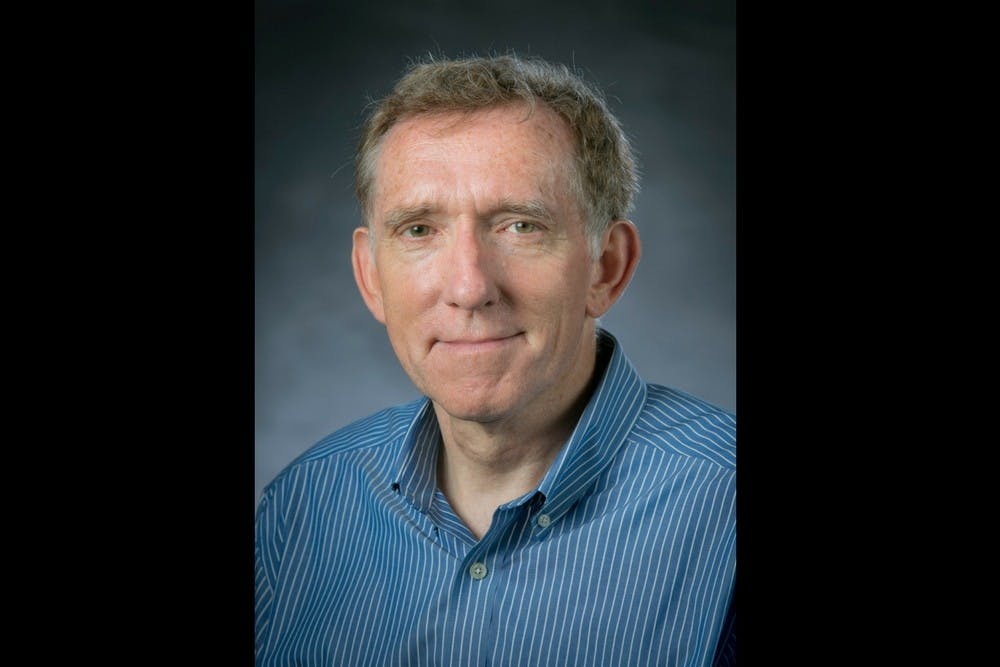A professor at the Divinity School has offered his resignation following several disputes with other faculty members about racial equity training and the culture of academic freedom in the school.
The controversy centered around an email exchange between Paul Griffiths, Warren professor of Catholic theology, and other members of the Divinity School community that was published in The American Conservative Sunday. Thomas Pfau—Alice Mary Baldwin professor of English with a secondary appointment in the Divinity School—said Griffiths has resigned effective June 2018, but he did not know if the University had accepted.
“I profoundly regret his decision and, indeed, have conveyed to him that I regard it as a mistake,” Pfau told the News and Observer. “He is one of the preeminent theologians working in the United States today and a vital resource for students and colleagues engaged in rigorous theological reflection here at Duke.”
The conflict seems to have begun earlier in the Spring 2017 semester.
Anathea Portier-Young, associate professor of Old Testament, sent an email to Divinity School faculty in February, inviting them to a “Racial Equity Institute Phase I” training. She wrote that people who previously participated in the training—which took place during two full days in March—reviewed it as “transformative, powerful and life-changing.”
In a response sent to the faculty, Griffiths discouraged them from attending, predicting it would be “intellectually flaccid: there’ll be bromides, clichés, and amen-corner rah-rahs in plenty.” He went on to say that the event was anti-intellectual and “totalitarian.”
Dean of the Divinity School Elaine Heath responded to the email chain noting that she was looking forward to the training.
"I am deeply committed to increasing our school’s intellectual strength, spiritual vitality and moral authority, and this training event will help with all three," she wrote.
Heath also condemned the “use of mass emails to express racism sexism, and other forms of bigotry,” though she did not directly mention Griffiths.
Pfau entered the exchange in defense of Griffiths, writing that he viewed Griffiths' criticism as being in regard to the amount of time faculty were being asked to spend on meetings, trainings and other activities. He urged his colleagues to focus on “calm reflection and intellectual engagement.”
The American Conservative also published an email sent from Griffiths to his colleagues claiming that Heath and Portier-Young had launched “shameful” disciplinary actions against him.
“The convictions that some of my colleagues hold about justice for racial, ethnic and gender minorities have led them to attempt occupation of a place of unassailably luminous moral probity,” Griffiths wrote. “That’s a utopia, and those who seek it place themselves outside the space of reason.”
Heath and Griffiths attempted to work out a time to meet but were ultimately unsuccessful, according to the email.
Heath then sent Griffiths a letter telling him it was “unacceptable” for him to “refuse to meet with me as Dean of the Divinity School” and that he was not permitted to attend faculty meetings, during which he had displayed “inappropriate behavior” for past two years, she said. Continued refusal to meet could lead to a loss of travel or research funds, the letter stated.
The disciplinary process launched by Portier-Young went through the Office of Institutional Equity. The emails published by The American Conservative indicate that it was about racist and sexist speech, which created a hostile workplace. OIE and Griffiths did not meet and instead exchanged emails, so OIE began to compile a report with a potential for sanctions from the University.
Pfau told the News and Observer that as far as he knew, Griffith’s decision was not pressured by the University.
Originally from England, Griffiths is a scholar of Catholic theology and is the author of 17 books. He came to Duke in 2008. According to The New York Times, Griffiths in 2014 signed onto a statement by Catholic theologians drawing attention to racial injustice and calling for policing reform.
"We commit ourselves to placing our bodies and/or privilege on the line in visible, public solidarity with movements of protest to address the deep-seated racism of our nation," the signees pledged in the statement.
Heath sent The Chronicle a statement in defense of the Divinity School's diversity trainings.
Get The Chronicle straight to your inbox
Sign up for our weekly newsletter. Cancel at any time.
“Duke Divinity School is committed to scholarly excellence and academic freedom, which includes a commitment to diversity and inclusion," the statement read. "We seek to foster an environment where diversity of opinions is respected and members of the community feel free to engage in a robust exchange of ideas on a range of issues and topics. We believe that all faculty have a right to speak out as members of a civil academic community, and if all voices are to be heard, diverse perspectives must be valued and protected. As part of an ongoing effort to foster and support such a community, we will continue to offer voluntary opportunities for faculty, staff and students to participate in diversity training.”
She also noted that approximately 35 people ended up attending the training, which was a recommendation from the school's Faculty Diversity and Inclusion Standing Committee. It covered racism's history in America and how it is perceived sociologically by different people.
Michael Schoenfeld, vice president for public relations and government affairs, said that Duke does not comment on personnel matters. Neither Griffiths nor Portier-Young could be reached for comment.
Neelesh Moorthy contributed reporting.
Editor's note: This article was updated at 11:48 p.m. to include information about the racial justice statement Griffiths signed in 2014.
Adam Beyer is a senior public policy major and is The Chronicle's Digital Strategy Team director.

